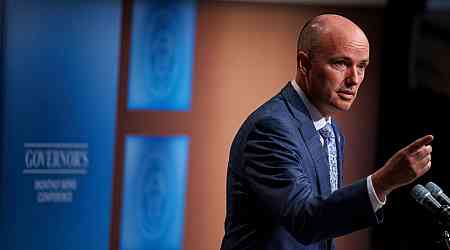In “Hillbilly Elegy,” the 2016 memoir that made JD Vance a celebrity, he described constantly remaking his childhood self to fit the rotating cast of father figures his unsound mother brought into their lives. “With Steve, a midlife-crisis sufferer with an earring to prove it, I pretended earrings were cool — so much so that he thought it appropriate to pierce my ear,” Vance wrote. “With Chip, an alcoholic police officer who saw my earring as a sign of ‘girlieness,’ I had thick skin and loved police cars. With Ken, an odd man who proposed to Mom three days into their relationship, I was a kind brother to his two children.”
Vance’s yearning for a father is a constant theme in the book, as is his willingness to rationalize the flaws of the men he looks up to. At one point, he is reunited with his biological father, who gave him up for adoption when he was in kindergarten. The women in Vance’s life — not just his mother, but also his beloved sister, grandmother and aunt — told him that his dad had been “mean” and abusive, but he doesn’t believe it, preferring to think that there had only been “a bit of pushing, some plate throwing, but nothing more.”
His father was a devoted Pentecostal, and for a time Vance gave up his Black Sabbath CDs and became one, too. “I’m not sure if I liked the structure or if I just wanted to share in something that was important to him — both, I suppose — but I became a devoted convert,” he wrote.
“Devoted convert” may be the role he inhabits most naturally. In 2016 Vance speculated that Donald Trump might be “America’s Hitler.” Now he’s his running mate. A lot has been written trying to understand Vance’s ideological journey, but at least part of the story seems to be hiding in plain sight in his book. In attaching himself to the most bellicose patriarch he can find, he’s reenacting a childhood pattern.
There is, of course, nothing inherently pathological about changing one’s political views. Vance, however, swapped out not just his beliefs but his entire public persona in just a few short years. “Hillbilly Elegy” contains an indictment of “conspiracy-mongers and fringe lunatics” who spread lies about Barack Obama’s religion and birthplace. And it laments the corrosive cynicism that led many in his white working-class community to embrace these falsehoods.
Vance presented their views as self-defeating: “We can’t trust the evening news. We can’t trust our politicians. Our universities, the gateway to a better life, are rigged against us,” he wrote, adding, “You can’t believe these things and participate meaningfully in society.”
Now Vance promotes all these things. He’s argued that Alex Jones is more trustworthy than Rachel Maddow and that Joe Biden may be intentionally flooding the country with fentanyl to kill off MAGA voters. He gave a speech in 2021 titled, “The Universities Are the Enemy.”
Vance’s new worldview can be explained in part by opportunism: He was anti-Trump at a time when Trumpism seemed likely to fail. And he’s said he was “red-pilled” by the cultural upheavals of 2020, a common enough phenomenon, especially in the Silicon Valley circles he travels in. But there is something particularly extreme about Vance’s transformation, suggesting he hasn’t left behind the mutability that once served as a survival strategy.
As Gabriel Winant wrote in a perceptive essay in the journal N+1, “Hillbilly Elegy” is fundamentally a book about unresolved trauma. In one of the book’s final moments, Vance gains some insight into his own behavior by reading up on “adverse childhood experiences,” or ACEs. Kids who endure violent and chaotic childhoods like his, he wrote, “become hardwired for conflict. And that wiring remains, even when there’s no more conflict to be had.”
His upbringing had taught him that “disagreements were war, and you played to win the game.” Understanding this, he wrote, helped him navigate his relationship with his wife, Usha. But he seems to have stopped there, rather than reckon with how his pugilistic instincts shape his approach to the wider world.
In 2020, Vance wrote an essay detailing his journey from Pentecostalism through the new atheism of Christopher Hitchens and finally into Catholicism. He portrayed his young adult rejection of religion as essentially mimetic, something he absorbed from his university surroundings rather than decided on for himself. One of the things that brought him back to religion was meeting right-wing venture capitalist Peter Thiel, who would eventually become a patron. Thiel “was possibly the smartest person I’d ever met, but he was also a Christian,” Vance wrote. Vance converted to Catholicism in 2019. By then, he’d become part of a new conservative elite in which many leading intellectual figures were also Catholic.
Now this person of unusual suggestibility has become second in command to a first-order demagogue, giving himself over to MAGA theology. As Mother Jones reported Thursday, Vance recently endorsed a new book called “Unhumans,” co-written by “Pizzagate” conspiracy theorist Jack Posobiec, which demonizes progressives as nonpeople who must be crushed by extra-democratic means. “Our study of history has brought us to this conclusion: Democracy has never worked to protect innocents from the unhumans,” they wrote.
It is perhaps not surprising that Vance has ended up in this milieu. Authoritarian personalities, as German social psychologist Erich Fromm argued, long to dominate, but they long just as much to submit.
This article originally appeared in The New York Times.
function onSignUp() { const token = grecaptcha.getResponse(); if (!token) { alert("Please verify the reCAPTCHA!"); } else { axios .post( "https://8c0ug47jei.execute-api.us-east-1.amazonaws.com/dev/newsletter/checkCaptcha", { token, env: "PROD", } ) .then(({ data: { message } }) => { console.log(message); if (message === "Human































